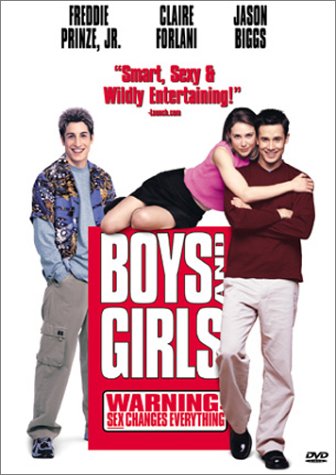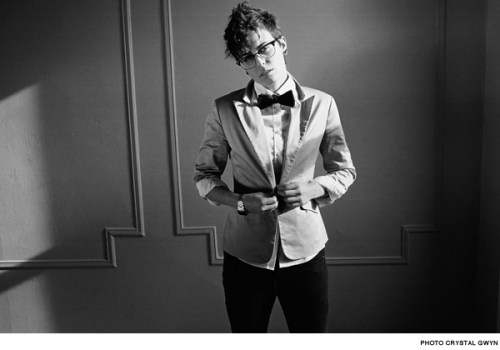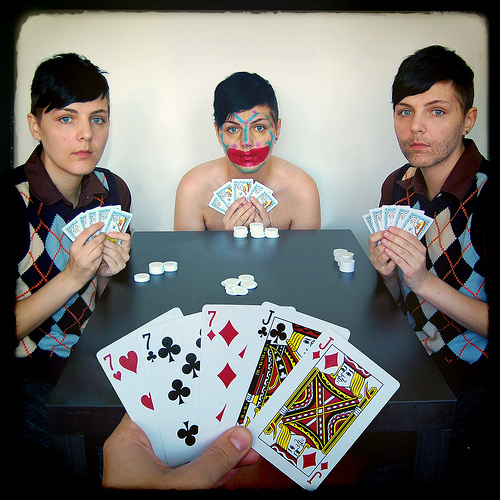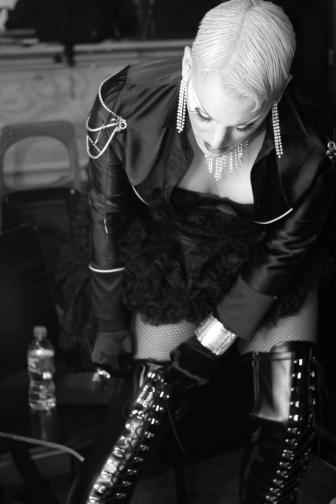Ladies and otherwise identifying persons, today I would like to talk to you about Judith Butler.
Sweet mother of pearl WHY, you ask? Because she is THE hero/ine of difficult-to-understand contemporary critical gender theory, and therefore VERY IMPORTANT to the radical lesbian feminist agenda and also to impressing that cute girl with the alternative lifestyle haircut who is always talking about the patriarchy. Also, she’s a lesbian, and there is a rule that says lesbians must always care about other lesbians. Here at Autostraddle, we are all about Lesbian Feminist Revolution and also impressing cute girls, so we want to help.

Chances are that you have heard of Judith Butler. Maybe you saw that she was included in the epic list of books to fulfill your feminist desires. Maybe you saw that she recently (and badassedly) turned down an award for Civic Courage at Berlin Pride saying that it should go instead to local feminist and queer organizations that promote anti-racism. Maybe, like me, you had a total nerdgasm over the description of Judith Butler as “the MacGuyver of queer theory.” Maybe you do/did feminism/women’s/womyn’s/gender/queer studies in college and enjoy arguing with strangers who try to hit on you about gender theory. If this is the case, we should probs hang out, just sayin’.
So here is the thing about Judith Butler: she is incredibly hard to read. Maybe you saw Gender Trouble on the Feminist Reading List and thought to yourself, “I find gender troubling, so I should obviously read this” and then you opened it up and were confronted with sentences like the following one:
Juridical notions of power appear to regulate political life in purely negative terms – that is, through the limitation, prohibition, regulation, control and even ‘protection’ of individuals related to that political structure through the contingent and retractable operation of choice.
That kind of a sentence probably gave you some feelings, and in this YOU ARE NOT ALONE. I am a bigtime Butler fangirl, and I don’t find the experience of reading her particularly pleasurable. I alternate between being amazed/challenged by her ideas and wanting to throw the book at the wall.

So why do people bother to slog through it? Because Judith Butler’s ideas REVOLUTIONIZED the way we understand sex and gender. Gender Trouble was published in 1990, and all critical theory regarding gender since then has taken it into account.
So, what’s the big screaming deal? Performativity, my friend. Butler argues that there is no “prior truth.” It’s the repeated performance of gender which actually constructs the physical condition of sex while simultaneously hiding that construction. I know, I know, not that straightforward, but bear with me and I’ll try my best to explain.
To start, we’ll need to go right back to the basics, which means definitions:
SEX: the reproductive, chromosomal and hormonal organs and processes that place a body in the categories of male, female or intersex.
GENDER: the set of processes and practices that shape our understanding of sexed bodies; the way a sexed body becomes socially intelligible, that is, a “man” or a “woman,” “masculine” or “feminine.”
Whereas “sex” means having a particular kind of body that falls into one of two categories, male or female, “gender” is the way sex gains social meaning – the behaviors and processes that define someone as a man or a woman or somewhere in between. Implicit in these definitions of “man” and “woman” is the idea that society’s dominant understanding of masculinity and femininity is the normal and natural way for particular bodies to play out gender based on their sex.

Being male or female inevitably leads to the expression of a SPECIFIC KIND of “manliness” or “womanliness” – you know, “boys will be boys”? And it doesn’t take a rocket surgeon to know that these rigid understandings of masculinity and femininity don’t really fit everyone so perfectly. Everybody knows girls look HOT in menswear.

I know this is probably old hat for many of you, but language is SUPER IMPORTANT to Butler’s theories so we all need to be on the same page. Butler is heavily influenced by the work of Michel Foucault (author of History of Sexuality) and other post-structuralist philosophers who argue that language is more than just a medium through which we understand the world; the world we understand through language is actually CREATED by the process of describing it in language. In other words, reality is discursively constructed, and there is no prediscursive reality – that is, there is no “reality” outside of its construction in language.
In Gender Trouble, Butler challenges dominant understandings of the relationship between sex and gender that view gender as naturally emerging from a sexed body. She argues that sex is always already a gendered category:
“Gender must also designate the very apparatus of production whereby the sexes themselves are established.”
Gender, she argues, is the lens through which we understand the body. Our ideas that link penis with male and vagina with female are already gendered – they’re part of a binary system that divides human bodies into two distinct types of beings. We can’t, Butler argues, understand or relate to our human bodies outside of the central system of gender; therefore, bodily sex cannot exist prior to gender, as sex must be gendered in order for us to understand it.
Butler argues that since gender is a social construct and not a natural part of existence – and since we understand biological sex in terms of gender (male and female genitalia, for instance) – biological sex isn’t “real” either, at least not in the way we usually assume it is. Like gender, sex only exists as something that we create through language.
Is your brain hurting yet? Have a look at this cute kitten and process for a minute:

Okay! Let us continue along the path to brain explosion (the good kind, I promise).
So! If sex is always gendered and therefore can’t exist prior to gender, then it has to exist concurrent with or after gender – those are the only options left.
Butler argues that gender structures and creates the notion of biological sex, but how does it do this, exactly? Through a process that Butler calls “performativity“: a repeated series of acts, words, and discourses that create and define the notions of masculinity and femininity.
Gender is not something you are, it is something you do.
+
In Butler’s words,“gender is the repeated stylisation of the body, a set of repeated acts within a highly rigid regulatory frame that congeal over time to produce the appearance of substance.” The repeated performance of gendered expectations – everything from little things like the way you sit or walk to highly gendered practices like breastfeeding – cements these expectations as “normal.”
It’s this repetition that actually constructs the idea that gender is something you are: I am a woman, therefore I walk a certain way. Butler wants you to turn that on its head: I walk a certain way, therefore I am a woman.

It’s not quite as clear-cut as that, though. We’re exposed to gendered performance practically from birth, so it’s very difficult to exist in this world without adhering to some kind of gendered expectations. I’m a big Judith Butler fan, and I believe her argument, but it doesn’t change my understanding of myself as a woman; gendered identity is so structuring that I don’t know if it can ever be totally escaped. I certainly don’t think that I can escape it, even though I understand “woman” to be a social construct much like “homecoming queen” or “Jersey Shore.”

Let’s recap for a second, shall we? According to Butler,
1. Sex does not exist outside of gender. Our understanding of the sexed body is created by gendered language and expectations that separate bodies into two categories, male and female.
2. Gender is “performative.” “Masculinity” and “femininity” are actually constructed by the way we play out those terms with our own bodies. Gender itself doesn’t create the performance; it’s the performance that creates gender. In other words, “gender is an imitation for which there is no original.”

Butler takes these notions a step further and argues that the ways that we perform gender “create the illusion of an interior and organising gender core, an illusion discursively maintained for the purposes of the regulation of sexuality within the obligatory frame of reproductive heterosexuality.”
In English, this means that the repeated performance of gender allows the sexed body to be understood within the framework of gendered expectations, while simultaneously creating the notion that sex is the basis for gender, and that our differently shaped bodies inevitably lead us to perform particular expressions of femininity or masculinity.
And THAT, my friends, is performativity! Round of applause for JB!
 But before we go, we need to talk about the magical world of drag! Judith Butler thinks drag is awesome and that we should all get our drag on. Seriously! Drag is a great example of what Butler talks about, because it involves a dislocation between anatomical sex, gender identity and gender performance. She argues that drag “reveals the imitative structure of gender itself – as well as it’s contingency.”
But before we go, we need to talk about the magical world of drag! Judith Butler thinks drag is awesome and that we should all get our drag on. Seriously! Drag is a great example of what Butler talks about, because it involves a dislocation between anatomical sex, gender identity and gender performance. She argues that drag “reveals the imitative structure of gender itself – as well as it’s contingency.”
Drag contests the system of gender through consciously subversive performances of it, using the techniques of parody and pastiche to challenge the dominant notions of identity that structure our society.
So start queering gender in your everyday lives! Judith Butler says so! You’ll be helping to dismantle the patriarchy AND challenge heteronormative gender ideals. And doesn’t that sound like FUN?
(It is.)
Has your brain exploded? Are you hungry for more? You can buy Gender Trouble as well as her follow up, Bodies that Matter. If that’s not enough light reading for you, check out Foucault’s History of Sexuality as well!









Comments
Articles like these are why I LOVE, LOVE, LOVE Autostraddle!!
I was definitely up until 4:30am today trying to understand what on earth she was saying before I made a total fool out of myself in class.
Only on Autostraddle can I find pictures of sexy girls and posts about crazy-wordy gender theorists. You guys make being gay even that much better! ;)
Thanks! I think all theory is better when broken up with pictures. I think it should be a rule. “All academic theory must contain pretty things to rest the brain”. Think it will take off?
Agreed! The Autostraddle Education, bringing sex and sensibility full circle. Maybe ya’ll can start and online degree program?
“Sex and Sensibility” is a book Jane Austen should have written.
DINGDINGDING
that’s your slot machine making a winning sound.
[ehm. sounded kinda dirty after all.]
This is amazing. A very very good summary. Also: Foucault! I’m in love.
Thanks!
How could you know Foucault and not love him? He is eminently loveable.
As a humourless academic lesbian type who is currently writing a thesis that has a lot to do with JB this post gave me a lot of feelings. Mostly, the feeling THAT I LOVE AUTOSTRADDLE FOR POSTING THINGS LIKE THIS. In all caps no less.
^ This.
I’m currently writing on the construction of transgender identity. Needless to say I’ve been spending more time with “The Butler” than with my friends lately. It’s very much a tale of love and hate.
“Your mother writes like Judith Butler” is now the most common insult in this lesbian household… ;)
Also, if you’re interested in gendery goodness and find Butler hard to get into, grab a copy of Queer Theory, Gender Theory. An Instand Primer by Riki Wilchins. It makes the whole subject very approachable and fun to read. :)
This post is all about my FEELINGS about JB. So much love, so much anger…
Exactly. Mostly love, I think. Though it is possible that my copy of Gender Trouble has a few ripped corners from where I threw it at the wall in frustration. Not that I do that regularly or anything. Or at all. I was, er, just throwing it for a friend, I SWEAR.
another person heavily influenced by Foucault and Butler is Kathy Acker. She wrote Blood and Guts in High School, My Mother: Demonology: A Novel, and In Memoriam to Identity to name just a few. She is very hard to read for the simple fact that she does not believe in plot. Once you get over that you realize she is amazing. She is very much concerned with gender roles, specifically women’s roles in american society. Her characters sometimes have no names, they are referred to as him and her and, usually, as whore. She really tries to convey what it feels like to be something called a woman in american society. Everyone should try to read her once because she is amazing in a weird, hard-to-understand kind of way.
I LOVE KATHY ACKER. i have this quote on a sticky-note on my desktop: “Was it possible that someday — someday — I would hold naked in my arms, and continue to hold and continue to hold, pressed close to my body, a woman on whose femininity and masculine strength I could lean, trusting, whose mettle and daring would place her so high in my esteem that I would long to throw myself at her feet and do as she wished? I dared hardly believe what I was asking. I dared hardly believe myself.”
Autostraddle, you’re really good today
You’re really good today.
Um, Kathy Acker died in 1997 and wrote most of her work before the publication of Gender Trouble. Especially Blood and Guts in High School. I don’t get how she’s influenced by Butler…
In any case, very fun post !
Great post!
I was introduced to Butler’s theory of gender performance through my performance art class in university, and was intrigued by what she had to say. I finally bought a copy of Gender Trouble (for $6 at Value Village!) a few weeks ago, started reading it, and felt very stupid. Reading “abridged” versions of cultural theory like this make ploughing through dense texts a lot easier.
REISE, I LOVE ACKER TOO! my friend and I were thinking about a quote of hers about the body for a tattoo, trying to be all ironicall and all, but since there are so many good ones it going to take a long time to find one I love.
and Mia, I reference Seeing Gender by Kathy Acker, pg 80: “I wasn’t. I had no name. For me, Butler argues, I could be entered, but I could not enter, and so I could neither have nor make meaning of the world. I was unspeakable, so I ran into the language of others.”
more people should read these people and the world would be a better place.
More people should read them. If only they didn’t make it so difficult!
ok so i think this is a great article! and i realize that it is about judith butler’s GENDER performativity. but i was really disappointed when you defined ‘sex.’
first sex was defined: “SEX: the reproductive, chromosomal and hormonal organs and processes that place a body in the categories of male, female or intersex.” which is actually a GREAT definition.
but then not two sentences later the elaboration of the definition said: “Whereas “sex” means having a particular kind of body that falls into one of two categories, male or female…” so wait, there’s only two categories? you JUST said there were three.
i recognize that butler is talking about ‘masculine’/’feminine’ and that most of society falls into the ‘male’/’female’ sex binary but i think that if you are going to include intersex in your definition of ‘sex’ then the elaborating of your definition should also be inclusive.
don’t take me wrong, this was a REALLY great article and i was super happy that it was here on autostraddle! i just think that if we choose to be ‘PC’ and inclusive then we should go all the way in our inclusivity. and especially since we are already such a marginalized community, we don’t need to marginalize others.
keep up the great work!
I get what you mean but intersex is not really a recognized sex in the sex/gender binary queer theorists criticize.
[That’s why for a long, long time intersexed individuals were pretty much automatically assigned a sex right after birth (surgically) depending on how long their clitoris/penis was and/or what other sexual organs they had. (I know this sounds crazy, but that’s how it is. Scary thought.) Letting a child be “between the sexes” was just not an option. That’s only just now starting to change, I think.]
Hey Kim,
I used sex in that manner because, like Feylamia says, intersex is not generally recognised in the sex binary of male and female that is being criticised in this instance. Intersexuality is really interesting though, confusing these categories in a different way. If you haven’t, you should read Anne Fausto-Sterling, she has a lot to say on this topic. The Five Sexes is a good starting point. Ta!
Cultural matrix of intelligibility ya’ll! Boy…posts like this sure do make me miss school – butler is totally the good kind of brain exploding – this made my day, and reminded me that I want to make shirts that say “talk theory to me baby”…hehe.
Sharing the link ’cause it gave me a happy when I first found it: Judith Butler @ LOLTHEORISTS.
LOL THEORISTS MAKES MY LIFE
They had me at male gaze. I wish they had been around when I first started uni. <3
autostraddle is teaching me about things I never knew I needed so. much.
I’m actually nearly dying here and nobody’s there to laugh with me, DANG.
Interesting timing! I’m working on a couple of characters that explore masculinity & femininity based on the cultures of my family & where I grew up in (Bangladeshi/Malaysian) and already I’ve spotted some significant differences between gender expectations back home/with my family and that of Australians or many other Western cultures. Then you have the split between what is ideal (e.g. feminine = sophisticated, graceful, accommodating) and what actually plays out in reality (women = loud, overbearing, emotional).
Then you become a migrant and it’s a whole other ballgame altogether!
thanks for the post, and the comments with the recs are great :)
One more recommendation: There’s a pretty good Companion to Gender History by Blackwell Publishing you may want to check out. :-)
Great article. These past two weeks I’ve been psyched for a class I’ve just started called “Intro to Social Geography”, mainly because Butler has already been cited countless times. Everytime her name comes up, the radical feminist/artist/queer/sociologist/geographer in me just screams “yes, yes, yes!”.
You did a great job of explaining the ideas in lamens terms, and I just thought I’d mention that I may or may not have every intention of referring any confused classmates I encounter to this article. Just sayin’.
Thanks! Glad I can help!
I picked up Gender Trouble a month or two ago from the library and promptly returned it, I don’t think I got past the first page. I can’t read something that dense unless I’m in the right frame of mind but when I’m ready to sit down and focus I’ll give it another try.
this is super amazing. please be my teacher.
Thanks! Tell your university to hire me!
Even though I learned most of this in a gender studies class I took in college, this still blew my mind:
“In other words, reality is discursively constructed, and there is no prediscursive reality – that is, there is no “reality” outside of its construction in language.”
I remember having my mind blown in that gender study class when we were given an assignment to go to a toy store and really take a look at the separation of boys and girls toys and the way that the two sections are advertised, colored, displayed, etc. Basically boys are given tools and trucks to play with and girls are given ovens and vacuum cleaners. I swear I had my life flash before my eyes and every pink dress and Barbie doll floated before before me until I had an urge to tear down the bright pink “Girls” sign on the shelf. Now every time I see my niece and nephew I want to give my nephew a Barbie to play with and give my niece my nephew’s astronomy set. It’s really amazing when you take a look at all of the subtle messages we’re sent from birth.
Awesome article. Thanks for the kitty break. My brain needed it.
Discursive reality explodes your mind in all the best ways…
once used a Butler name drop to pick up a girl.
Did you mention that Butler’s an expert in the field of study known as Rhetoric? That’s why the work is written like chunky mashed potatoes. If you already said something like this, sorry, it’s really early!:)
im definitely a brain explosion , but this is awesome .
having **
Does Butler actually identify as a lesbian? Just curious.
Well she is a founder of the queer theory movement, and has critiqued the identity category of ‘lesbianism’ for being restrictive, so I can’t say for sure how she would label herself, but she does, as far as I am aware, have a female partner.
Yep, female partner = Wendy Brown, another theorist. Brown can also make that book-throwing thing happen.
Maybe dense prose is sexually transmissible?
You should pass that piece of wisdom on to the sex-ed folks. Might be more effective than the abstinence spiel.
Poker photo credit: Zory Montpetit
http://www.flickr.com/photos/locatei/3933145062/in/set-72157617673792346/
This is great. And yes, she does have a female partner. But she has been criticized by some of the lesbian feminist movement for the extreme BDSM practices she participates in.
BDSM-friendly definitely explains part of the performative dimensions to her theory
Then do animals other than humans have a gender?
This article is amazing.
Best explanation of JB I’ve ever heard.
I love Judith Butler, oh she’s amazing :)
thanks for breaking her down as well and that picture on top makes me want to go to UO and get a cup like it.
before I got destracted by loltheorists I actually wanted to write a comment…
first of all, this late afternoon I had nerdgasms all over the place, thnx so much! [partly because I was watching Criminal Minds at the same time, at first only because of the Kirsten Vangsness parts, but then again I’m really into this whole profiler-thing, so, anywho…]
Now I want to read Butler’s work even more, although a friend already warned me about her writing. I am almost finished with Kate Bornstein’s “Gender Outlaws” [and waiting for “Next Generation”] and that might have been a tidbit more amusing and easier to read…
I have almost managed to trick a friend of mine into reading it as well, and she was grumping about me mentioning gender theory in the first place. It wasn’t too hard, because the important parts for her were obv “funny” and “quotes Batman”, while “Batman” beats everything.
Once I dreamt I would go back to Sweden to study Gender Studies, but my mom crushed that dream by eye-rolling and blurting out “another degree”.
Maybe it’s a good thing though. If I think about gender theory too much my brain does funny things and tries to explode. But it’s good to be educated about certain things and question the way one thinks these things are supposed to be from time to time.
It can make one question one’s sexuality as well, but I haven’t felt comfortable enough to go that far yet.
I’m just more aware of the fact that I have a gender identity and that that might be femme, but at the same time it makes me hungry for trying drag and cross-dressing more often again.
Thank you for this overview! It was not only way easier to understand than the text itself, but also entertaining in its own right.
After I first read this yesterday, I started trying to compose an argument about how her theories make my butch identity uncomfortable but I keep running into ways to explain around it. Does anyone know of anything I could read that would help me unpack this issue in my mind-grapes?
You could try reading ‘Female Masculinity’ by Judith Halberstam – it’s a very intersting exploration of some of the challenges posed by butchness and other forms of female masculinity. Other than that ‘The Persistent Desire: A Butch-Femme Reader’ by Joan Nestle has been very influential.
Hope that helps!
Is there any evidence that what she says is true? Has anyone done any experimentation? Is experimentation possible? Or are the whole concepts of experimentation and evidence inapplicable, as they are to, say the analysis of Byronic couplets as an Art Form?
For example, here is a view from “Sexual Hormones and the Brain: An Essential Alliance for Sexual Identity and Sexual Orientation” Garcia-Falgueras A, Swaab DF Endocr Dev. 2010;17:22-35
“Boys and girls behave in different ways and one of the stereotypical behavioral differences between them, that has often been said to be forced upon them by upbringing and social environment, is their behavior in play. Boys prefer to play with cars and balls, whereas girls prefer dolls. This sex difference in toy preference is present very early in life (3–8 months of age). The idea that it is not society that forces these choices upon children but a sex difference in the early development of their brains and behavior is also supported by monkey behavioral studies. Alexander and Hines, who offered dolls, toy cars and balls to green Vervet monkeys found the female monkeys consistently chose the dolls and examined these ano-genitally, whereas the male monkeys were more interested in playing with the toy cars and with the ball….”
One can criticise such studies on the grounds of inherent Patriarchal researcher bias, though that’s a bit difficult to do in the case of Alexander and Hines.
Moreover, there’s research showing that girls with CAH (Congenital Adrenal Hyperplasia – a masculinising form of Intersex) also show “male pattern” behaviour, contrary to expectations and upbringing.
That gender is mostly a social construct is well-evidenced and well-established. For example, in the 19th century, pink was viewed as a “masculine” colour. There have been many times in history where men were adorned with makeup and frills, and women were not.
But “mostly” does not mean “completely”; and there is evidence that some “gendered behaviour” is actually “sexed behaviour”. A minority to be sure, and such claims must be backed by good evidence. Some behaviour – such as mathematical ability, traditionally thought to be sexually differentiated – has been shown by evidence to be no such thing.
However to deny that sexually (as opposed to gender) differentiated behaviour exists disempowers Transsexual and Intersexed people – much like expecting the Blind to see if they just tried hard enough, that visual impairment is a performance, not a biological reality. So the question is not merely of academic interest.
I don’t feel qualified to get into the way assigning sex and gender entirely to performativity is/can be oppressive for trans and intersex people, but wrt your childhood studies, the book “Delusions of Gender” by Cordelia Fine does a really fantastic and fascinating breakdown of the science around gender and sex difference, including the study you cite. It’s extremely readable and I highly recommend it.
society creates this norm and mold for people to try to identify themselves. it’s 2010 and i don’t think individualism will fade away.
Thanks so much! The most lucid and fun description of Butler’s stuff that I have found:)
I’ve read this post about fifty thousand times and I still haven’t got my head around it. Like how can our PERCEPTION of something (like gender/sex) change the physical nature of it? I mean if sex is a physical thing, how can it only be defined by our perception? *head hurties*
So my understanding of Butler is that perception does not change the physical nature of biology, at least in terms of whether you have a vagina or a penis (the traditional biological dichotomy of sex). But we perceive biological things to be gendered (e.g., if you have a vagina, you are a woman). So gender creates “sex.”
People are biologically different in a bazillion ways, but, Butler is saying, what we’ve done in creating this particular biological category is in not random or incidental. It’s a function of gender, which is all about power.
Aha! I see what you mean. More to think about :P
That makes a lot of sense, but WOW seperating the two – what a headfark!
[…] Judith Butler’s Gender Trouble bothered the seemingly inviolable (if inevitably failing) logics equating one’s sex with one’s […]
I’ll second Zoe Brain. Also, Butler p*sses on trans people in another way – in Bodies that Matter, she says that while drag and transgender practices can be cool and subversive, transsexuality only ever offers “an uncritical miming of the hegemonic”. She (seems to) uncritically adopt quite a large chunk of 2nd wave cissexism, by ignoring the existence, of, for example, butch trans women, non-binary identified folk who need medical intervention, etc.
I’ll second Zoe Brain. Also, Butler is bad for trans people in another way – in Bodies that Matter, she says that while drag and transgender practices can be cool and subversive, transsexuality only ever offers “an uncritical miming of the hegemonic”. She (seems to) uncritically adopt quite a large chunk of 2nd wave cissexism, by ignoring the existence, of, for example, butch trans women, non-binary identified folk who need medical intervention, etc.
Funny, the note that “women look hot in menswear.” Honestly, I find that blazers, ties, jackets, slacks… when well tailored, look sharp and hot on -anyone-. I don’t think it’s a sexuality thing or a “ooo it’s a girl dressed as a boy!!!” but, simply, the style is a wildly attractive one. And it’s longevity is a testament to the fact.
Aaaah Judith… loved and hated at the same time. As some others who have commented on it, I’m using it for my thesis on masculinities (notice the plural form) in Spanish 17th century lit. Bumping into this post was a pleasant surprise and I’ll surely be adding your website to my google reader :)
It’s always nice to find intelligence in the online masses… such scarcity of grey matter these days!!
I know you wrote this ages ago, but! I recently tried to read Gender Trouble to impress a lady, covered the first thirty pages in sticky notes, and gave up grumpily. There’s so much good in there, but it’s so hard to pick out… even for a pretty literate scientist type.
SO… thank you! This explains lots, gives me courage to (maybe?) try Butler again, and more ideas for possibly lighter reading from the comments.
<3
Hi Julia. I just wanted to thank you for your article. I respect Butler but I see no reason to be deliberately convoluted. She is not the only one, many literary critics, theorists, and philosophers do not want to be lucid. Nietzsche, with all his misogyny and Wagner loving, was at least straightforward.
I’m teaching on a stage one course for the first time, and in the 3rd lecture of the semester I got all excited because the lecturer started talking about Butler in relation to Caryl Churchill’s Cloud Nine… then I looked around and saw the students squirming and coughing and clearly lost and realised I’d need to get them excited about Butler too… I shall be sending them this way in the hopes that this easily accessible outline + pictures of cute kittens to break it up will do that!
Fantastic article Julia! My brain is still contemplating and processing what was read, but in the meantime I’d like to say the following about the girl in the first picture from this article:
What a great translation of Butler! Needed this in first-year women’s studies. I’m curious to see what your opinions are on JB’s inaccessibility? The fact that we NEED a translation. Shouldn’t feminist theorists, in an attempt to liberate us from all sorts of oppression, make their books understandable to the average joe (re: non-academic, professorial types).Just my musings and I’m glad my love/hate relationship with JB isn’t just me. BTW – during my grad studies we affectionately called her “Judy” when referring to her impenetrable texts.
[…] across an article that purported to explain Judith Butler in more understandable language (read here). I have no idea whether this is an accurate representation of Butler or not, but I found that […]
I think I need a whole course just to understand her; I was also flummoxed by the dense prose.
Just wanted to add one thing: I think any post which discusses “Performing Gender” really needs to at least mention the pioneering 1987 article “Doing Gender” by Candace West and Don Zimmerman (http://gas.sagepub.com/content/1/2/125) where they claim that gender is something that people “do” rather than something they are.
Thank you very much for making this much easier version of Butler’s gender theory of performativity. I was reading some Butler’s work which became the main source for my undergraduate thesis on queer theory which earned me bachelor’s degree last June 2014 and now I am teaching one session on the feminism class about Butler. I can definitely link this source for them to learn.
The theory of discursive/linguistics based construction of reality as the underpinning of JB s gender performance, omits the inputs derived from the non linguistic conscious perception of our own physical/biological structure, as created through genetic/epigenetic mechanisms any role in the process of forming our reality.
I think her theory is likely to be either surpassed or integrated into a more complete theory of gender as future better knowledge of the role of consciousness and perception in all aspects of our understanding of reality emerges.
The lack of our ability to understand how perception works (what creates the difference between a burning sensation and an ache anyway? Do those sensations change as we learn more language?) leads us to too much separation between mind and body in our theories of psychology. To ignore that connection imperils any psychological theory.
Does anybody think animals without Noam Chomsky’s language acquisition tool evolve without an innate sense of gender or are born a tabula rasa?
What’s Going down i am new to this, I stumbled upon this I have found It absolutely helpful and it has aided me out
loads. I’m hoping to give a contribution & help different customers like its helped me.
Great job.
[…] In order for sex to exist, gender must have already been established for humans to understand it [8]. Since biological sex is understood through an understanding of gender (classifying genitalia as […]